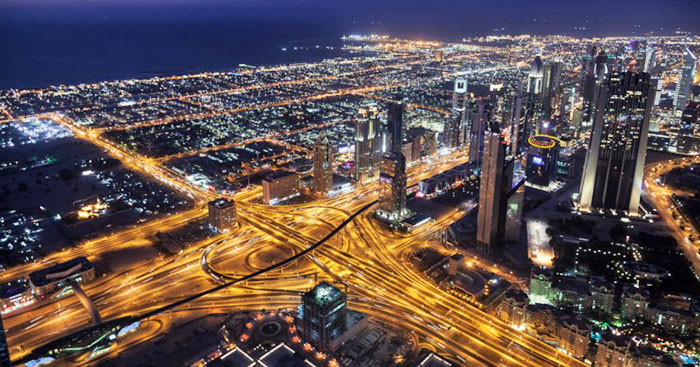Internet of Things
(IoT)
The Internet of Things (IoT) is what keeps everything in
the city connected. It’s the spine of the city which allows each
movement and connects each dot.
IoT offers advanced connectivity of,
...and all systems
and services that go beyond machine-to-machine (M2M)
communication.
Everything that is a part of a smart city needs to be connected
to each other so they can communicate with each other as part of
a whole.
The IoT provides the
body of communicating devices that provides seamless
communication providing smart solutions to every situation and
problems.
Geospatial Technology
The right way to build urban planning for smart cities requires
accuracy and the analysis and use of detailed data.
This is exactly the
role that Geospatial or Geolocation technologies
play. They provide the underlying foundation upon which every
smart city solution can be built.
Geospatial technology provides location and the necessary
framework for collecting and analyzing data, transforming such
data in a way that facilitates software-based solutions around
smart city infrastructure.
Artificial
Intelligence (AI)
The vast amount of data generated by a smart city would be
useless without using
Artificial Intelligence (AI) to
process it in order to generate information and value.
AI processes and
analyzes data generated from Machine-to-Machine (M2M)
interaction in the context of a smart city, smart stores, and
city infrastructure.
There are countless smart city applications where AI can play a
key role. From improving traffic to smart parking management to
the safe integration of autonomous ride-share cars and shuttles.
Moreover, the use of AI allows city management to have a precise
understanding of how the city is working.
AI can help in
autonomous public transport route planning, power grid
management, smart traffic management, drone delivery, autonomous
postal services, or healthcare facility units, just to mention
of few of numerous applications within the smart city context.
Robotics
Human-robot collaborations can augment city, work, health, and
social life in the smart cities of the future.
Integrating robots in
urban spaces is rapidly transforming some of the most
technologically advanced cities in the words into real smart
cities.
Cities such as Dubai,
Tokyo, and Singapore are examples of how robots in the real
world can co-live with humans.
Experts in the field of robotics are positive about the benefits
that working robots can bring to society in various fields. The
human-robot collaboration needs to take into account two things:
How robots work and how humans decide to use robots.
In 2020, Japan is going to introduce robot taxis for the
tourists travelling to the country for the Olympic Games.
Smart chairs are
going to be ready at the airport for the Paralympians. And
social robots are going to interact with humans in 20 different
languages.
Robots with the
function of social translators are going to help foreigners
communicate with the locals in Japanese.
This may sound part of a science fiction movie. However, it's a
reality soon to be experienced by many visitors in Tokyo.
Dubai's smart city project includes working social robots in
public services, pretty much in the same way the city of
Rotterdam, in the Netherlands, is doing.
Dubai is also using
robots in surveillance and policy, and transportation systems,
something Dubai expects to have at least 25 percent automated by
2030 toward its bigger goal in 2050.
Dubai's flying taxi was developed by German drone firn
Velocopter and tested in Dubai's airspace in 2017.
A humanoid police
officer is also part of Dubai's plans. After the trial is
completed, Dubai is going to be replacing 25 percent of its
police force with police robots by 2030.
In Singapore, the national government plans on introducing
robots as a physical extension for management and city control
of existing systems.
Having tested this
possibility for years now and in collaboration with Airbus
helicopter bus shuttles which are driverless, robots are used as
the Singapore Post Delivery via drone.
Singapore hotels also use service robots to clean rooms and room
service.
Additionally, a
current pilot is evaluating how robots can be used for
pre-school education in a near future.
Virtual
Reality (VR) and Augmented Reality (AR)
"Simply put,
we believe
Augmented Reality
is going to
change the way
we use
technology forever."
Tim Cook
CEO of Apple
Inc.
For the development of smart cities, immersive technologies such
as Virtual Reality (VR) and Augmented Reality (AR)
represent a key component of the Fourth Industrial
Revolution.
Both Virtual Reality and Augmented Reality require a massive
amount of data and they need it fast in order to deliver the VR
and AR experience on the move.
For this, the
importance of getting the 5G networks across the world ready is
the first step to guarantee the success of these technologies.
Once 5G is in place, we can expect to live in a world that it
was only possible in the science fiction realm just a few years
ago.
Now, a 'reality'...
Blockchain
technology
Blockchain is transforming the
whole global digital economy.
However, Blockchain
technology is still a pretty new concept in the smart city
environment. Integrating Blockchain technology into smart cities
can play a paramount role in connecting all the smart city
services at the same time that can boost security and service
transparency.
Blockchain technology can be used in self-executing contracts or
smart contracts; these are agreements between the parties
directly written into lines of code.
Smart contracts allow
for trusted and transparent transactions without the need for a
mediating third party. This makes the process easier, cheaper,
safer, and much faster.
Blockchain technology can help in billing and transactions
processing, handling facilities management, or facilitating
smart grid energy sharing.
Blockchain
City Movie
The
Blockchain City documentary film is a compilation of
interviews to international Blockchain experts who are currently
already implementing Blockchain technology in their cities.


